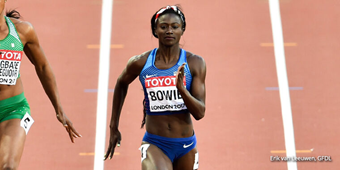Nutrition and Female Athletes: Unlocking the Door to Peak Performance

Answer a few questions and we'll provide you with a list of primary care providers that best fit your needs.
The motto “Faster, Higher Stronger” has motivated the world’s greatest athletes since the Olympic Games launched in 1896. This ideal has prompted both athletes and coaches to search for ways to improve their performance, knowing that the slightest advantage can often mean the difference between silver and gold.
Evaluating an athlete’s diet has long been a key factor when attempting to improve and enhance performance. However, professionals are only beginning to realize that nutritional needs vary from person to person. More specifically, recent discoveries reveal that male and female athletes have uniquely different needs that must be recognized and addressed in order to achieve peak performance.
Orthopedic sports medicine specialist Aloiya Kremer, MD, recently spoke with Premier Health Now about these differences and the specific gains that female athletes are making to perform at their very best.
One Size Doesn’t Fit All
Dr. Kremer explains that in general, it’s important to understand that athletic training and nutrition are highly individualized, since athletes will still perform differently, even if they’re using the same training program and diet. She says that it’s a long-held myth that one nutritional approach suits every athlete, when in reality, dietary needs vary from one individual to the next. Caloric and macronutrient requirements (carbs, protein, fat) can vary from day to day, depending on the type and amount of training. Female athletes in particular must also consider other factors if they expect to perform at their very best.
“In female athletes, different phases of the menstrual cycle lend to different training adaptations and nutrient needs,” says Dr. Kremer. “For example, during the first couple of weeks of each cycle, when the body absorbs and uses energy more efficiently, restricting calories could work against the body’s efforts. The body wants to build muscle during this time, and depriving it of the energy to do so can be especially fatiguing.”
More and more women have begun discovering that there may be serious consequences for ignoring key signals from their own bodies. Dr. Kremer adds that it’s more common for female athletes to experience energy deficiency, where the caloric demands of training are greater than caloric intake.
“If this becomes an ongoing issue, it can lead to performance plateaus, menstrual cycle irregularities, bone density loss, illness, and injury,” says Dr. Kremer. “I encourage female athletes who have menstrual irregularities like missed periods to meet with a sports medicine provider to determine if energy imbalance could be the culprit.&rdquo
Answer a few questions and we'll provide you with a list of primary care providers that best fit your needs.
Source: Aloiya Kremer, MD, Orthopedic Sports Medicine Specialist with Premier Orthopedics




